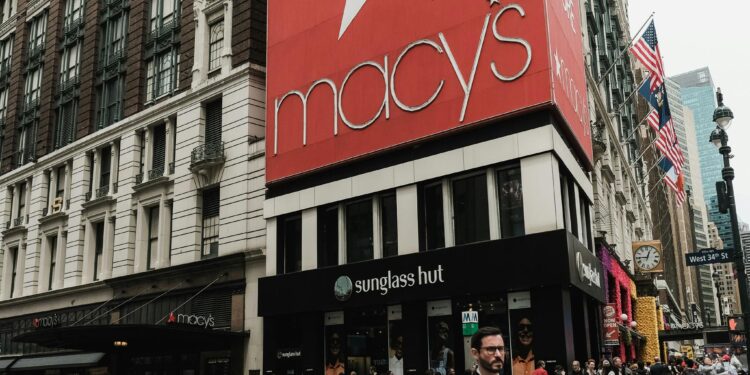Shares Plunge Following Decision to Decline $5.8 Billion Offer
Macy’s (M) experienced a significant drop in shares on Monday after the department store chain announced it had ended discussions with two potential investors regarding a buyout. The company’s decision to proceed with its own turnaround strategy instead of accepting the investor proposal led to a 16% decline in shares, marking the steepest fall in four years.
The investor group, consisting of Arkhouse Management Co. and Brigade Capital Management, had initially proposed a $5.8 billion buyout in December. They raised their bid to $24 per share in March and then to $24.80 in June. Despite the increased offers, Macy’s found the proposals unconvincing and lacking sufficient financial backing. The company stated that the financing commitment letters did not provide the necessary assurance for the board to proceed.
Macy’s CEO Tony Spring, who took over leadership in February, emphasized the company’s commitment to executing its own turnaround plan. This plan comes in response to challenges posed by inflation-weary consumers who are increasingly favoring online purchases over traditional brick-and-mortar shopping.
Spring’s strategy involves closing underperforming stores and investing in the top 50 performing stores to enhance merchandise offerings and improve store displays. Drawing from his experience at Bloomingdale’s, Spring aims to create a more attractive shopping environment in these key locations. These top-performing stores will serve as a testing ground for new strategies, with successful initiatives potentially being rolled out to other locations.
In addition to revitalizing Macy’s stores, Spring plans to expand Bluemercury, the high-end skincare and cosmetics chain that has seen robust sales growth. The post-pandemic surge in demand for beauty products has bolstered Bluemercury’s performance, prompting plans to open 30 new locations and remodel an equal number by 2026. The chain is also exploring the addition of more services, such as hair styling and facials, which have proven successful at competitors like Ulta Beauty Inc.
The decision to call off the buyout talks may allow Macy’s to focus more effectively on its growth strategy. Mary Ross Gilbert, an analyst at Bloomberg Intelligence, suggested that ending the discussions could eliminate distractions and help the retailer concentrate on restoring growth.
Despite these efforts, the broader department store sector in the US remains under pressure. Executives across the industry are grappling with how to navigate a challenging retail environment. The owner of Saks Fifth Avenue is in the process of acquiring Neiman Marcus Group, and the founding family of Nordstrom Inc. is considering taking the retailer private. These moves highlight the ongoing search for profitable paths forward in a shifting market landscape.
Macy’s decision also had a ripple effect on other retailers. Shares of Nordstrom fell by up to 5.3% following the announcement, while Kohl’s Corp. experienced a decline of up to 3.6%.
Representatives for Arkhouse and Brigade did not immediately respond to requests for comment, leaving the future of Macy’s independent turnaround plan in the spotlight. As the company moves forward, it will need to navigate the complexities of the current retail environment while implementing its strategic initiatives to regain its footing and drive growth.
In conclusion, Macy’s choice to reject the investor buyout and pursue its own turnaround strategy marks a pivotal moment for the historic department store chain. Under Tony Spring’s leadership, the company aims to adapt to changing consumer behaviors and revitalize its operations. While the path ahead may be challenging, Macy’s commitment to innovation and strategic investment in key areas could position it for a more sustainable future in the evolving retail landscape.
You might like this article: Future Directions in Obesity Treatment: Survey Insights and Innovations











